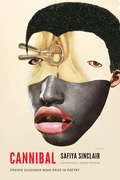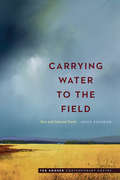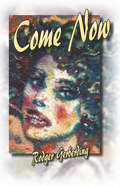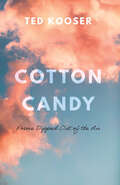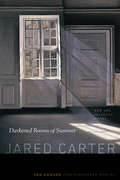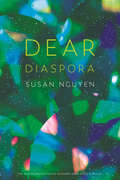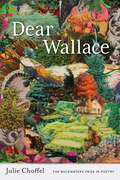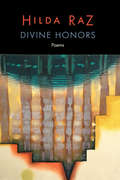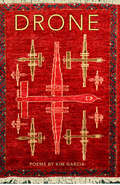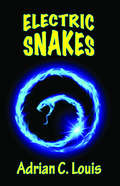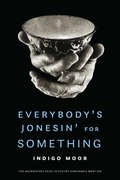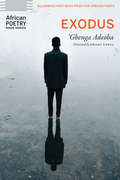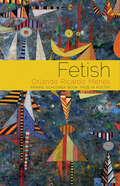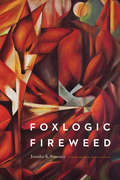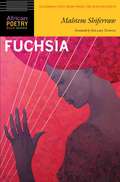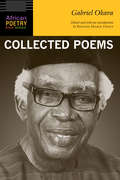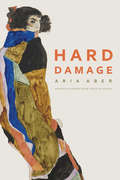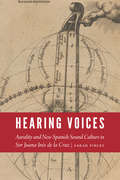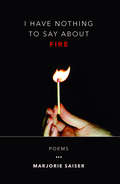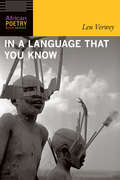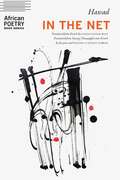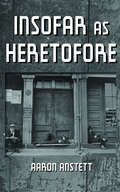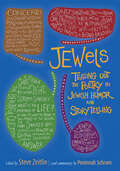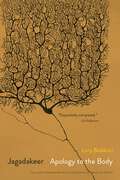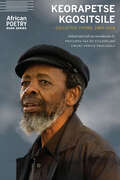- Table View
- List View
Cannibal (Prairie Schooner Book Prize in Poetry)
by Safiya SinclairColliding with and confronting The Tempest and postcolonial identity, the poems in Safiya Sinclair’s Cannibal explore Jamaican childhood and history, race relations in America, womanhood, otherness, and exile. She evokes a home no longer accessible and a body at times uninhabitable, often mirrored by a hybrid Eve/Caliban figure. Blooming with intense lyricism and fertile imagery, these full-blooded poems are elegant, mythic, and intricately woven. Here the female body is a dark landscape; the female body is cannibal. Sinclair shocks and delights her readers with her willingness to disorient and provoke, creating a multitextured collage of beautiful and explosive poems.
Carrying Water to the Field: New and Selected Poems (Ted Kooser Contemporary Poetry)
by Joyce SutphenJoyce Sutphen’s evocations of life on a small farm, coming of age in the late 1960s, and traveling and searching for balance in a very modern world are both deeply personal and familiar. Readers from Maine to Minnesota and beyond will recognize themselves, their parents, aunts and uncles, and neighbors in these poems, which move us from delight in keen description toward something like wisdom or solace in the things of this world. In addition to poems selected from the last twenty-five years, Carrying Water to the Field includes more than forty new poems on the themes of luck, hard work, and the ravages of time—erasures that Sutphen attempts to ameliorate with her careful attention to language and lyrical precision.
Come Now
by Rodger Gerberding"In COME NOW, Rodger Gerberding reminds us of just how necessary the modernist's dogged desire to employ everything in the world: philosophies, myths, ideologies, art, snippets of conversation, jokes, the detritus of popular culture, to lyric effect has been for denizens of the so-called information age. These poems reflect a probing intellect and an emotional candor that position Gerberding as a poet who is utterly convinced by the urgent need for poetry in our contemporary world, and one who sets out to remind us of the beauty that is produced when a gifted writer practices what he believes."—Kwame Dawes
Cotton Candy: Poems Dipped Out of the Air
by Ted Kooser&“Poems dipped out of the air&” describes the manner in which Ted Kooser composed the poems in Cotton Candy, the result of his daily routine of getting up long before dawn, sitting with coffee, pen, and notebook, and writing whatever drifts into his mind. Whether those words and images are serious or just plain silly, Kooser tries not to censor himself. His objective is to catch whatever comes to him, to snatch it out of the air in words, rhythms, and cadences, the way a cotton candy vendor dips an airy puff out of a cloud of spun sugar and hands it to his customer. Poems written in fun and now shared with the reader, Kooser&’s playful and magical confections charm and delight.
Darkened Rooms of Summer: New and Selected Poems (Ted Kooser Contemporary Poetry)
by Ted Kooser Jared CarterFor nearly half a century Jared Carter has been quietly mapping the American heartland. Line by line, his poetry has shown us the landscape, sounded the voices, conjured the music, and tested the silence of the ever-changing and yet ever-constant Midwest that figures so prominently in the American story. And yet what we find in Carter’s poetry is endlessly new. Here, in poems selected from his first five books, is the summer-long buzz of the cicada and the crack of the cue ball, the young rebel on his big Harley, and the YMCA secretary who backstrokes her way across the indoor pool. Here, too, are thirty new poems in fixed form that illustrate Carter’s continued quest for a poetry of “universal interest.” Taken together, these selections are, truly, poetry in the American grain.
Dear Diaspora (The Raz/Shumaker Prairie Schooner Book Prize in Poetry)
by Susan NguyenDear Diaspora is an unapologetic reckoning with history, memory, and grief. Parting the weeds on a small American town, this collection sheds light on the intersections of girlhood and diaspora. The poems introduce us to Suzi: ripping her leg hairs out with duct tape, praying for ecstasy during Sunday mass, dreaming up a language for buried familial trauma and discovering that such a language may not exist. Through a collage of lyric, documentary, and epistolary poems, we follow Suzi as she untangles intergenerational grief and her father&’s disappearance while climbing trees to stare at the color green and wishing that she wore Lucy Liu&’s freckles. Winner of the Raz/Shumaker Prairie Schooner Book Prize in Poetry, Dear Diaspora scrutinizes our turning away from the trauma of our past and our complicity in its erasure. Suzi, caught between enjoying a rundown American adolescence and living with the inheritances of war, attempts to unravel her own inherited grief as she explores the multiplicities of identity and selfhood against the backdrop of the Vietnamese diaspora. In its deliberate interweaving of voices, Dear Diaspora explores Suzi&’s journey while bringing to light other incarnations of the refugee experience.
Dear Wallace (The Backwaters Prize in Poetry)
by Julie ChoffelWinner of the Backwaters Prize in PoetryDear Wallace addresses the poet and insurance executive Wallace Stevens in an attempt to reconsider art, power, and creativity amid the demands of everyday responsibility. Exploring relationships between modernism, motherhood, poetry, and privilege, the speaker of these poems puts her daily routines in dialogue with his. Curious, funny, and wry, Julie Choffel confronts Stevens as an unlikely peer who lived and wrote in the same city and weather as she does now, imagining a present-day conversation about the many ways creative practice is informed by social context. As we struggle to marry creative independence with our communal obligations, the questions in these poems are more urgent than ever. Stevens, a proxy for beauty, inventiveness, and legitimacy, becomes an audience for the ennui, anxiety, and politics of care that characterize another kind of writer&’s life today.
Divine Honors: Poems
by Hilda RazThis elegant and moving collection documents Hilda Raz&’s experience with breast cancer. The journey, from diagnosis to chemotherapy to mastectomy, from denial to humor to grief and rage, is ultimately one of courage and creativity. The poems themselves are accessible and finely wrought. They are equally testaments to Raz's insistence on making an order out of chaos, of finding ways to create and understand and eventually accept new definitions of good and evil, health, blame, and personal boundaries—in short, a new sense of self. These poems remain intimately bound to the world and of the senses, becoming documents of transformation.
Drone (The Backwaters Prize in Poetry)
by Kim GarciaDRONE is a lyric meditation on modern warfare, in our technological and digital age. Written from a variety of perspectives and personas, it explores the human, animal, personal, and domestic aspects of the wars being fought by the US for incomprehensible reasons with indefinable outcomes. Swift and wide ranging, these poems explore experiences of soldiers, military families, prisoners, immigrants, and more.
Electric Snakes
by Adrian C. Louis"In ELECTRIC SNAKES, Adrian C. Louis's thirteenth poetry collection, no one is spared his critical eye, including himself. These powerful and often humorous poems cover myriad subjects: Trump, music, zombies, Jimmy John's, childhood, caller ID, venetian blinds, magpies, love, and Mom."—From the Editor
Everybody's Jonesin' for Something (The Backwaters Prize in Poetry Honorable Mention)
by Indigo MoorTurning an unflinching spotlight on the American Dream, Indigo Moor plunges headfirst into national—and personal—laments and desires. From Emmett Till to the fall of the Twin Towers and through the wildfires of Paradise, California, Moor weaves a thread through the hopes, sacrifices, and Sisyphean yearnings that make this country the beautiful trap that it is. Everybody&’s Jonesin&’ for Something takes an imagistic leap through the darker side of our search for life, liberty, and the pursuit of happiness, perusing what we lose, what we leave behind, and what strange beauty we uncover.
Exodus (African Poetry Book)
by ‘Gbenga AdeobaWinner of the Sillerman First Book Prize for African Poetry, &‘Gbenga Adeoba&’s collection Exodus focuses on forms of migration due to the slave trade, war, natural disasters, and economic opportunities. Using the sea as a source of language and metaphor, Adeoba explores themes of memory, transition, and the intersections between the historic and the imagined. With great tenderness and power his poetry of empathy searches for meaning in sharply constructed images, creating scenes of making and unmaking while he investigates experiences of exile and displacement across time and place.
Fetish: Poems (The Raz/Shumaker Prairie Schooner Book Prize in Poetry)
by Orlando Ricardo MenesFrom sensual pleasures and perils, moments and memories of darkness and light, the poems in Orlando Ricardo Menes&’s collection sew together stories of dislocation and loss, of survival and hope, and of a world patched together by a family over five generations of diaspora. This is Menes&’s tapestry of the Americas. From Miami to Cuba, Panama to Bolivia and Peru, through the textures, sounds, colors, shapes, and scents of exile and emigration, we find refuge at last in a sense of wholeness and belonging residing in this intensely felt, finely crafted poetry.
Foxlogic, Fireweed (The Backwaters Prize in Poetry)
by Jennifer K. SweeneyWinner of the Backwaters Prize in Poetry, Jennifer K. Sweeney&’s Foxlogic, Fireweed follows a lyrical sequence of five physical and emotional terrains—floodplain, coast, desert, suburbia, and mesa—braiding themes of nature, domesticity, isolation, and human relationships. These are poems of the earth&’s wild heart, its searing mysteries, its hollows, and its species, poems of the complex domestic space, of before and after motherhood, gun terror, the election, of dislocation and home, and of how we circle toward and away from our centers. Sweeney is not afraid to take up the domestic and inner lives of women, a nuanced relationship with the natural world that feels female or even maternal, or a duty to keeping alive poetry&’s big questions of transcendence, revelation, awe, and deep presence in the ordinary.
Fuchsia (African Poetry Book)
by Kwame Dawes Mahtem ShiferrawWinner of the Sillerman First Book Prize for African Poets, Ethiopian American Mahtem Shiferraw’s Fuchsia examines conceptions of the displaced, disassembled, and nomadic self. Embedded in her poems are colors, elements, and sensations that evoke painful memories related to deep-seated remnants of trauma, war, and diaspora. Yet rooted in these losses and dangers also lie opportunities for mending and reflecting, evoking a distinct sense of hope. Elegant and traditional, the poems in Fuchsia examine what it means to both recall the past and continue onward with a richer understanding.
Gabriel Okara: Collected Poems (African Poetry Book)
by Brenda Marie Osbey Gabriel OkaraGabriel Okara, a prize-winning author whose literary career spans six decades, is rightly hailed as the elder statesman of Nigerian literature. The first Modernist poet of anglophone Africa, he is best known for The Fisherman’s Invocation (1978), The Dreamer, His Vision (2005), and for his early experimental novel, The Voice (1964). <p><p> Arranged in six sections, Gabriel Okara: Collected Poems includes the poet’s earliest lyric verse along with poems written in response to Nigeria’s war years; literary tributes and elegies to fellow poets, activists, and loved ones long dead; and recent dramatic and narrative poems. The introduction by Brenda Marie Osbey contextualizes Okara’s work in the history of Nigerian, African, and English language literatures. Gabriel Okara: Collected Poems is at once a treasure for those long in search of a single authoritative edition and a revelation and timely introduction for readers new to the work of one of Africa’s most revered poets.
Hard Damage (Prairie Schooner Book Prize in Poetry)
by Aria AberHard Damage works to relentlessly interrogate the self and its shortcomings. In lyric and documentary poems and essayistic fragments, Aria Aber explores the historical and personal implications of Afghan American relations. Drawing on material dating back to the 1950s, she considers the consequences of these relations—in particular the funding of the Afghan mujahedeen, which led to the Taliban and modern-day Islamic terrorism—for her family and the world at large. Invested in and suspicious of the pain of family and the shame of selfhood, the speakers of these richly evocative and musical poems mourn the magnitude of citizenship as a state of place and a state of mind. While Hard Damage is framed by free-verse poetry, the middle sections comprise a lyric essay in fragments and a long documentary poem. Aber explores Rilke in the original German, the urban melancholia of city life, inherited trauma, and displacement on both linguistic and environmental levels, while employing surrealist and eerily domestic imagery.
Hearing Voices: Aurality and New Spanish Sound Culture in Sor Juana Inés de la Cruz (New Hispanisms)
by Sarah FinleyHearing Voices takes a fresh look at sound in the poetry and prose of colonial Latin American poet and nun Sor Juana Inés de la Cruz (1648/51–95). A voracious autodidact, Sor Juana engaged with early modern music culture in a way that resonates deeply in her writing. Despite the privileging of harmony within Sor Juana’s work, however, links between the poet’s musical inheritance and subjects such as acoustics, cognition, writing, and visual art have remained unexplored. These lacunae have marginalized nonmusical aurality and contributed to the persistence of both ocularcentrism and a corresponding visual dominance in scholarship on Sor Juana—and indeed in early modern cultural production in general. As in many areas of her work, Sor Juana’s engagement with acoustical themes restructures gendered discourses and transposes them to a feminine key. Hearing Voices focuses on these aural conceits in highlighting the importance of sound and—in most cases—its relationship with gender in Sor Juana’s work and early modern culture. Sarah Finley explores attitudes toward women’s voices and music making; intersections of music, rhetoric, and painting; aurality in Baroque visual art; sound and ritual; and the connections between optics and acoustics. Finley demonstrates how Sor Juana’s striking aurality challenges ocularcentric interpretations and problematizes paradigms that pin vision to logos, writing, and other empirical models that traditionally favor men’s voices. Sound becomes a vehicle for women’s agency and responds to anxiety about the female voice, particularly in early modern convent culture.
I Have Nothing to Say about Fire
by Marjorie Saiser2017 Nebraska Book Award This new collection by Nebraska poet Marjorie Saiser explores the notion of witnessing. Particularly in our technological age, when we have access to international news as it happens, the question comes up: what responsibility do individuals—including those living in relatively quiet middle America—have in regard to world events? The poems in I Have Nothing to Say about Fire reference autobiographical elements: marriage, children, parents, in-laws, etc., but they also reference global tragedy: war, terrorism, genocide. As we experience our own personal losses and triumphs, what relationships should we strive for with family, friends, neighbors, and the strangers around us, particularly as their narratives push them forward into our and/or the public’s consciousness? In this book, Marjorie Saiser explores these essential questions and offers potential answers that may help all of us.
In a Language That You Know (African Poetry Book)
by Len VerweySouth Africa is a complicated, contradictory, and haunted place. Len Verwey captures the trajectory of life in such a place, dealing with childhood, war, marriage, divorce, and death. He explores the challenges posed by place and history, shared identities, deep embeddedness in the continent, and the legacies of violence and exclusion, as well as beauty. Verwey offers poems that speak of uncertainty, ask questions, and challenge simplistic and scapegoating narratives that become so tempting when living in a society undergoing intense social and economic pressure. Dealing less with factual or political explanations of war and more with the compulsion of war, in particular, “maleness” and violence, Verwey pulls the reader into another world, opening eyes to the “crisis of men,” the violence against women, children, and the foreign in a country where conflicts are again escalating. In a Language That You Know strives to understand the complexity of one of the most unequal, violent, yet most vibrant societies in the world.
In the Net (African Poetry Book)
by Mahmoudan HawadIn the face of amnesia, how does one exist? In this poem, Hawad speaks directly to Azawad, a silent figure whose name designates a portion of Tuareg lands divided among five nation-states created in the 1960s. This evanescent being, situated on the edge of the abyss and deprived of speech, space, and the right to exist, has reached such a stage of suffering, misery, and oppression that it acquiesces to the erasure implicit in the labels attached to it. Through an avalanche of words, sounds, and gestures, Hawad attempts to free this creature from the net that ensnares it, to patch together a silhouette that is capable of standing up again, to transform pain into a breeding ground for resistance—a resistance requiring a return to the self, the imagination, and ways of thinking about the world differently. The road will be long. Hawad uses poetry, &“cartridges of old words, / a thousand and one misfires, botched, reloaded,&” as a weapon of resistance.
Insofar as Heretofore
by Aaron Anstett"Culture's cloud chamber and its millions of random vectors drive Aaron Anstett's INSOFAR AS HERETOFORE. 'Whatever scintillants' he calls them in 'One Theory,' an exclamation that's half-prayer and half come-and-get-me bravado. The poems catch our socio-linguistic lightning flashes, at times fusing the erotic and the spiritual. This book is original and beautiful."—Michael Heller
JEWels: Teasing Out the Poetry in Jewish Humor and Storytelling
by Peninnah SchramJEWels is the first of its kind: the living tradition of Jewish stories and jokes transformed into poems, recording and reflecting Jewish experience from ancient times through the present day. In this novel hybrid—jokes and stories boiled down to their essence in short poems—Jewish witticism is preserved side by side with evocative storytelling and deepened with running commentary and questions for discussion. Illuminated here are jewels from journeys, from the Old Country, from Torah, shaped by the Holocaust, in glimpses of Jewish American lives, in Jewish foods, in conversations with God, and on the meaning of life. Jewish comedians (Lenny Bruce, Jackie Mason) appear alongside writers and musicians (Elie Wiesel, Sholem Aleichem, Itzhak Perlman) and Hasidic rabbis (the Baal Shem Tov, Rabbi Nachman of Breslov), yet most of the tellers are ordinary Jews. In this cacophony of ongoing dialogue, storytellers, rabbis, poets, and scholars chime in with interpretations, quips, and related stories and life experiences. In JEWels each of us can see our own reflection.
Jagadakeer: Apology To The Body (The Raz/Shumaker Prairie Schooner Book Prize in Poetry)
by Lory BedikianWinner of the Raz/Shumaker Prairie Schooner Book Prize in PoetryJagadakeer: Apology to the Body presents the voice of a daughter of immigrant parents, now gone, from Lebanon and Syria and of Armenian descent. In this five-part testimony Lory Bedikian reconstructs the father figure, mother figure, and the self. Using a sestina, syllabics, prose poems, and longer poetic sequences, Bedikian creates elegies for parents lost and self-elegiac lyrics and narratives for living with illness. Often interrupted with monologues and rants, the poems grapple with the disorder of loss and the body&’s failures. Ultimately, Bedikian contemplates the concept of fate, destiny (jagadakeer), and the excavation of memory—whether to question familial inheritance or claim medical diagnoses.
Keorapetse Kgositsile: Collected Poems, 1969–2018 (African Poetry Book)
by Keorapetse KgositsileKeorapetse Kgositsile, South Africa&’s second poet laureate, was a political activist, teacher, and poet. He lived, wrote, and taught in the United States for a significant part of his life and collaborated with many influential and highly regarded writers, including Gwendolyn Brooks, Sterling Plumpp, Dudley Randall, and George Kent. This comprehensive collection of Kgositsile&’s new and collected works spans almost fifty years. During his lifetime, Kgositsile dedicated the majority of his poems to people or movements, documenting the struggle against racism, Western imperialism, and racial capitalism, and celebrating human creativity, particularly music, as an inherent and essential aspect of the global liberation struggle. This collection demonstrates the commitment to equality, justice, and egalitarianism fostered by cultural workers within the mass liberation movement. As the introduction notes, Kgositsile had an &“undisputed ability to honor the truth in all its complexity, with a musicality that draws on the repository of memory and history, rebuilt through the rhythms and cadences of jazz.&” Addressing themes of Black solidarity, displacement, and anticolonialism, Kgositsile&’s prose is fiery, witty, and filled with conviction. This collection showcases a voice that wanted to change the world—and did.
